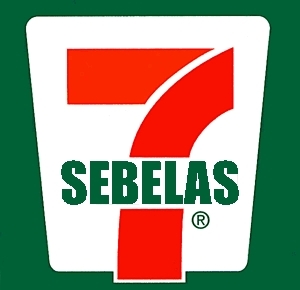October 05, 2006
Malaysia cracks down on "salad language"
 The Associated
Press reports that Malaysia's Minister of Culture, Arts and Heritage, Rais
Yatim, has announced a crackdown on the misuse of the national language
of Malay. Anyone displaying Malay signage that is deemed incorrect
by government authorities can be fined up to 1,000 ringgit ($271) after
a first warning. The
Star, The
New Straits Times, and the national news agency Bernama
provide more detail on the draconian measures, which will be enforced
by Dewan
Bahasa dan Pustaka (DBP), the agency charged with formulating
Malaysia's language policies.
The Associated
Press reports that Malaysia's Minister of Culture, Arts and Heritage, Rais
Yatim, has announced a crackdown on the misuse of the national language
of Malay. Anyone displaying Malay signage that is deemed incorrect
by government authorities can be fined up to 1,000 ringgit ($271) after
a first warning. The
Star, The
New Straits Times, and the national news agency Bernama
provide more detail on the draconian measures, which will be enforced
by Dewan
Bahasa dan Pustaka (DBP), the agency charged with formulating
Malaysia's language policies.
The particular offense that will be penalized is the commingling of Malay and English, which the AP notes is sometimes referred to as "Manglish" (a blend of Malay and English which implicitly suggests that any such mixture is a mangled version of one language or the other). Locally, such Malay-English mingling is usually referred to as bahasa rojak, or "salad language" (rojak being a spicy mix of fruits and vegetables popular in Malaysia). The "salad" idiom is actually used throughout Southeast Asia to disparage code-switching and other linguistic mixtures. A popular term for bilingual Javanese-Indonesian usage, for instance, is bahasa gado-gado, with gado-gado denoting another type of vegetable salad. (See the chapter on "language salad" in Joseph Errington's study of Javanese-Indonesian linguistic interaction, Shifting Languages.)
In the case of Malaysia, the attempt to ban salad language is part of a concerted attempt to bolster Malay nationalist integrity through "purification" of the national language. English, as in so many other parts of the world, is seen as the gravest threat to local linguistic purity, and in former British colonies like Malaysia that perceived threat is interlaced with fears of English as a neo-colonizing force deleterious to an independent nation. In Malaysia and elsewhere, however, there is a great tension between wariness of English linguistic imperialism and the recognition that English proficiency is a key for success in the globalized economy, particularly in technological fields. (The same tension has cropped up recently in the Indian state of Karnataka, including the high-tech hub of Bangalore, where a controversial ban on English-language classes has been enforced to support instruction in the local language of Kannada.)
Bloggers in Malaysia have, not surprisingly, reacted with a great deal of skepticism to the new measure. Here are snippets from two representative blog posts:
It seems as if our government does not really know what it wants to do and is staggering like a blind man without a cane in an unfamiliar place. On one side it laments the poor command of English especially among graduates, most of them Malays and on the other it continues to play the field with concocted threats to the national language and imagined attempts to downgrade it; a ploy that works well with the paranoid, the insecure and the Malay language fanatic. (The Malaysian)
[S]ign and billboard makers the nation over will probably rejoice at this news. What better way to rejuvenate the sign industry than to legislate language? Not so very long ago, Indian sign-makers had a big windfall when Bombay, Calcutta and Madras changed their names to Mumbai, Kolkata and Chennai respectively.
Let's look at an obvious example - all the 7-Eleven stores nationwide (around 700 outlets, and growing) would have to change their signage to 7-Sebelas. Think of how lucrative that signage contract is going to be. (myAsylum)
Others have questioned the proposed policy that commonly appearing English words and phrases should be replaced by new Malay nativizations, such as replacing Touch 'N' Go with Sentuh Dan Pergi, or Boulevard with Lebuh Perdana. Still others have mocked the idea that government authorities might change the name of MyKad, the Malaysian Government Multipurpose Card (a smart identity card that includes biometric information). MyKad is an interesting bit of bilingual play, combining kad (the Malay nativization of English card, representing a pronunciation spelling of non-rhotic British English) with my, which functions both as a first-person possessive pronoun and as a techie designation for Malaysia (it's the ISO country code and the top-level domain name for Malaysian websites). Despite its loanword status, kad is presumably considered a legitimate Malay word by the DBP, because it has been nativized since colonial times. But the my element is now suspect because of its Englishness, despite its subtle resonance with Malaysia's high-tech, Internet-savvy image. Such clever language play apparently has no place in Malaysia's new salad-free linguistic future.
Posted by Benjamin Zimmer at October 5, 2006 02:48 PM